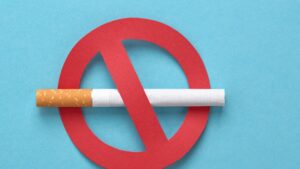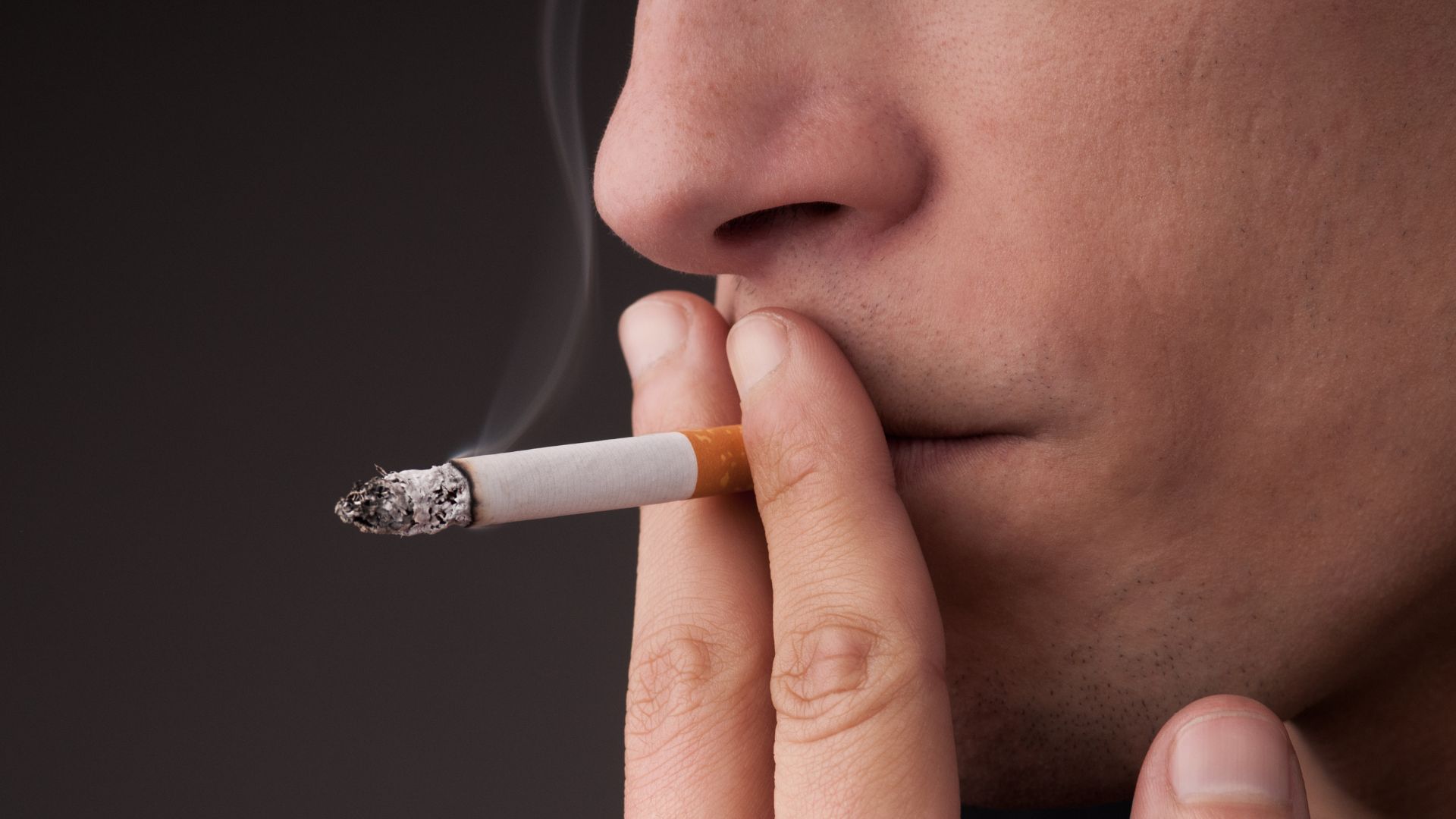Hey there, fitness enthusiasts! If you’ve ever wondered whether smoking and squats make a compatible pair, you’re in the right place.
In this blog post, we’re going to dive into the world of exercise, health, and the impact of smoking before hitting the squat rack.
Spoiler alert: It’s not a match made in workout heaven. So, grab a seat and let’s uncover why lighting up before lunges might not be the best idea!
Understanding whether smoking Cigarette “before performing squats” is bad or not.
Smoking before performing squats is not advisable. If you’re looking to maximize your squat performance and maintain a healthy lifestyle, it’s best to avoid smoking altogether.
Yes, smoking before performing squats can have several negative effects on your workout and overall health.
Here’s why:
Reduced Lung Capacity: Smoking damages your lungs and reduces their capacity to take in oxygen.
This can lead to decreased endurance during your workout, making it harder to complete squats or any other physical activity.
Decreased Cardiovascular Performance: Smoking also harms your cardiovascular system by narrowing blood vessels and increasing your heart rate.
This can result in reduced blood flow to your muscles, making it more difficult to perform squats effectively.
Weakened Muscles: Smoking can lead to reduced muscle strength and mass over time. This can hinder your ability to lift weights and perform exercises like squats, which require strong leg muscles.
Impaired Recovery: Smoking slows down the body’s ability to recover after exercise.
After performing squats, your muscles need time to repair and grow stronger. Smoking can delay this process, potentially leading to slower progress in your fitness goals.
Increased Risk of Injury: Smoking can impair your coordination and balance, increasing the risk of injury when performing squats.
Proper form is crucial for squats to avoid strains or accidents, and smoking can make it more challenging to maintain good form.
Overall Health Risks: Smoking is associated with a host of health problems, including lung cancer, heart disease, and respiratory issues.
Engaging in physical activity like squats is supposed to improve your health, but smoking counteracts those benefits.
In other words, smoking before performing squats can hinder your workout performance, increase the risk of injury, and have numerous detrimental effects on your overall health.
If you’re looking to get the most out of your squatting routine and maintain a healthy lifestyle, quitting smoking or avoiding it altogether is strongly recommended.

Further Explanations
Let’s dive deeper and explain further the point mentioned here.
First, let me provide a more detailed explanation of how smoking affects lung capacity and cardiovascular performance in the context of performing squats:
Reduced Lung Capacity:
Smoking involves inhaling toxic chemicals, including tar and nicotine, into the lungs. Over time, these substances cause damage to the delicate lung tissues and airways. Here’s how this affects lung capacity during squats:
Tar Buildup:
Tar, a sticky substance in cigarette smoke, accumulates in the lungs and coats the air sacs (alveoli).
This coating reduces the surface area available for oxygen exchange, making it harder for your lungs to take in sufficient oxygen.
Bronchial Constriction:
Smoking irritates and narrows the airways (bronchial tubes) in your lungs. This constriction reduces the airflow and limits the amount of oxygen that can reach your muscles during exercise like squats.
Reduced Oxygen Delivery:
With compromised lung function, your body struggles to deliver adequate oxygen to your muscles.
This lack of oxygen can lead to premature fatigue during squats, as your muscles require oxygen to function efficiently.
Decreased Cardiovascular Performance:
Smoking also has adverse effects on the cardiovascular system, which plays a crucial role in your ability to perform squats:
Narrowed Blood Vessels:
The chemicals in cigarettes cause blood vessels to constrict or narrow, a process known as vasoconstriction. This narrowing reduces the flow of blood and oxygen to your muscles, including the leg muscles used in squats.
Increased Heart Rate:
Smoking raises your heart rate and blood pressure temporarily. When you’re about to perform squats, an elevated heart rate can put additional strain on your cardiovascular system, making it more challenging to maintain the energy and stamina needed for the exercise.
Impaired Oxygen Transport:
With narrowed blood vessels and an increased heart rate, your cardiovascular system struggles to efficiently transport oxygen-rich blood to your muscles. This can lead to muscle fatigue and reduced endurance during squats.
In all this is that, smoking damages both the lungs and the cardiovascular system, which are essential for providing oxygen to your muscles during physical activity like squats.
These effects can result in reduced endurance, early fatigue, and a decreased ability to perform squats effectively.
Quitting smoking or avoiding it altogether is essential for improving your lung capacity and cardiovascular performance, thereby enhancing your overall fitness and workout outcomes.
Let’s explore a more detailed explanation of how smoking can weaken muscles and impair post-exercise recovery, particularly in the context of performing squats:
Weakened Muscles:
Reduced Blood Flow:
Smoking narrows blood vessels, which restricts blood flow to various parts of the body, including muscles.
When you perform squats, your leg muscles, including the quadriceps and hamstrings, require a steady supply of oxygen and nutrients to function optimally.
Reduced blood flow due to smoking can hinder the delivery of these essential components, affecting muscle performance.
Oxidative Stress:
Smoking introduces harmful free radicals into the body. These free radicals can damage muscle tissue and impair its ability to contract efficiently.
Over time, this can lead to reduced muscle strength and mass, making it more challenging to lift weights during squats.
Inflammation:
Smoking can also trigger chronic inflammation in the body. Inflammation interferes with the body’s natural processes for repairing and building muscle tissue.
This means that the muscle damage caused by squats may not heal as effectively in smokers, potentially leading to muscle weakness.
Impaired Recovery:
Delayed Healing:
Smoking hinders the body’s ability to repair and regenerate tissues, including muscles. After performing squats or any other exercise, muscle fibers develop microtears as a part of the natural growth and repair process. Smoking can slow down the healing of these tears, which is essential for muscle growth and recovery.
Reduced Oxygen Delivery:
As mentioned earlier, smoking reduces lung capacity and impairs cardiovascular function.
This means that the oxygen and nutrients needed for muscle recovery are delivered less efficiently to the muscles. Slower oxygen delivery can prolong the time it takes for muscles to recover after a strenuous exercise like squats.
Increased Risk of Injuries:
Weakened muscles and impaired recovery can also increase the risk of injuries during squats. Proper recovery is essential to prevent strains, sprains, and other workout-related injuries.
Smoking undermines this process, making it more likely that you’ll experience setbacks in your fitness journey.
In other words, smoking can weaken muscles by reducing blood flow, causing oxidative stress, and promoting inflammation.
Additionally, it impairs the body’s ability to recover from exercise by delaying healing, reducing oxygen delivery, and increasing the risk of injuries.
To optimize your muscle strength and recovery after squats, it’s advisable to quit smoking or avoid it altogether and focus on a healthy lifestyle that promotes muscle health and overall well-being.
Here is the explanations for the increased risk of injury and the overall health risks associated with smoking in the context of performing squats:
Increased Risk of Injury:
Impaired Coordination and Balance:
Smoking can affect your nervous system and cognitive function. It impairs coordination and balance, making it more challenging to maintain proper form during exercises like squats. Proper form is crucial to avoid strains, sprains, or accidents.
When your coordination and balance are compromised due to smoking, you’re more likely to perform squats incorrectly, increasing the risk of injury.
Reduced Focus and Reaction Time:
Smoking can also impair mental alertness and reaction time. During squats, especially when using heavy weights, quick adjustments in posture and balance may be necessary to prevent injury. Smoking can slow down your ability to react to these situations effectively.
Overall Health Risks:
Lung Cancer:
Smoking is a leading cause of lung cancer. Engaging in physical activity like squats requires a healthy respiratory system.
Smoking not only impairs lung function but also significantly increases the risk of developing lung cancer, which can be life-threatening.
Heart Disease:
Smoking is a major risk factor for heart disease. Squats, being a demanding exercise, put stress on the cardiovascular system.
Smoking narrows blood vessels, raises blood pressure, and promotes the buildup of arterial plaque, all of which increase the risk of heart problems during and after squats.
Respiratory Issues:
Smoking damages the airways and can lead to chronic respiratory conditions such as chronic obstructive pulmonary disease (COPD) and bronchitis.
Squats require deep breathing and good lung function. Smoking-induced respiratory issues can limit your ability to breathe effectively during squats, reducing overall performance.
Reduced Exercise Benefits:
Engaging in physical activity, including squats, is intended to improve overall health and fitness.
However, smoking directly counteracts these benefits by undermining lung and heart health, reducing physical stamina and endurance, and increasing the risk of exercise-related injuries.
This means that the positive effects of exercise are often diminished or negated by smoking.
In summary, smoking not only increases the risk of injury during squats by impairing coordination and balance but also poses severe overall health risks, including lung cancer, heart disease, and respiratory issues.
To maximize the benefits of your exercise routine and reduce the risk of injury, it’s highly advisable to quit smoking or avoid it altogether and prioritize a healthy lifestyle that supports your fitness goals and long-term well-being.
A tabular on this topic here.
Here’s a tabular representation of why smoking before performing squats is bad:
| Aspect | Explanation |
|---|---|
| Lung Capacity | Smoking damages lungs, reducing oxygen intake. |
| Cardiovascular Performance | Smoking narrows blood vessels, limiting blood flow. |
| Weakened Muscles | Smoking weakens muscles, hindering squat performance. |
| Impaired Recovery | Smoking delays muscle recovery and growth. |
| Increased Risk of Injury | Smoking impairs coordination and balance. |
| Overall Health Risks | Smoking is associated with lung cancer and heart disease. |
| Exercise Benefits | Smoking counteracts the positive effects of exercise. |
This table summarizes the detrimental effects of smoking on various aspects of performing squats and overall health.
It highlights why smoking before squats is not advisable due to the negative impact it has on lung function, cardiovascular performance, muscle strength, recovery, injury risk, and overall health.
Conclusion.
In conclusion, smoking before performing squats is strongly discouraged due to its adverse effects on lung capacity, cardiovascular performance, muscle strength, recovery, injury risk, and overall health.
Quitting smoking or avoiding it altogether is essential for optimizing your squat performance and maintaining a healthy lifestyle.

Hey there, it’s Mike Rrsq, the Editor-in-Chief over at Jsquat.com, and I’m absolutely obsessed with all things squat fitness! I’ve been lucky enough to get some serious recognition for my work in this field. With a solid background in the fitness and wellness industry, I’ve been there right from the get-go, helping shape this website into what it is today.
You see, I’m not just the boss around here; I’m also a passionate contributor. I love sharing my insights through my articles, and trust me, they’re not your run-of-the-mill stuff. Each piece I write is a labor of love, filled with my expertise and real-world experience in the fitness universe. So, if you’re into fitness and looking for some inspiration, you’re in the right place!

